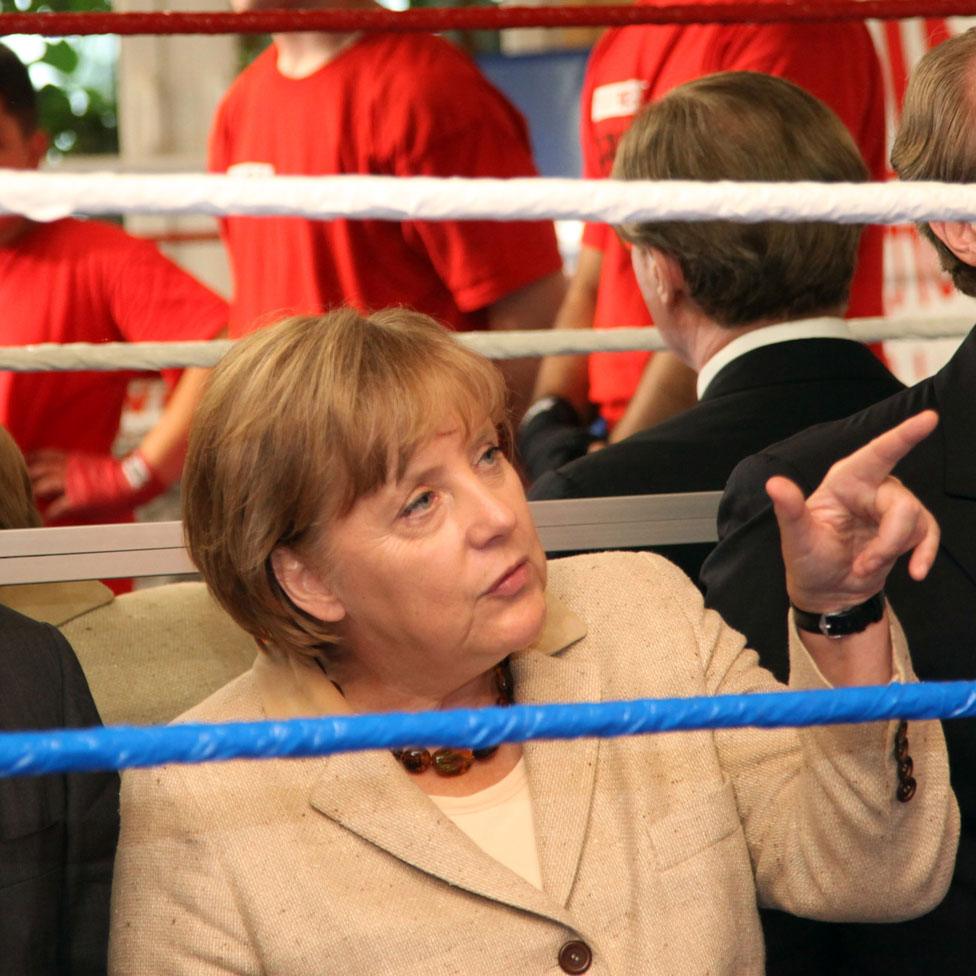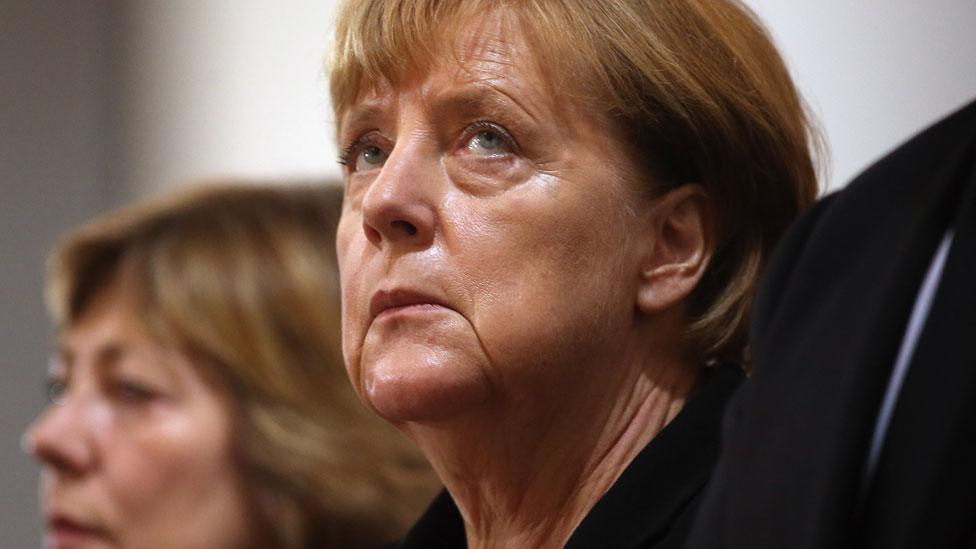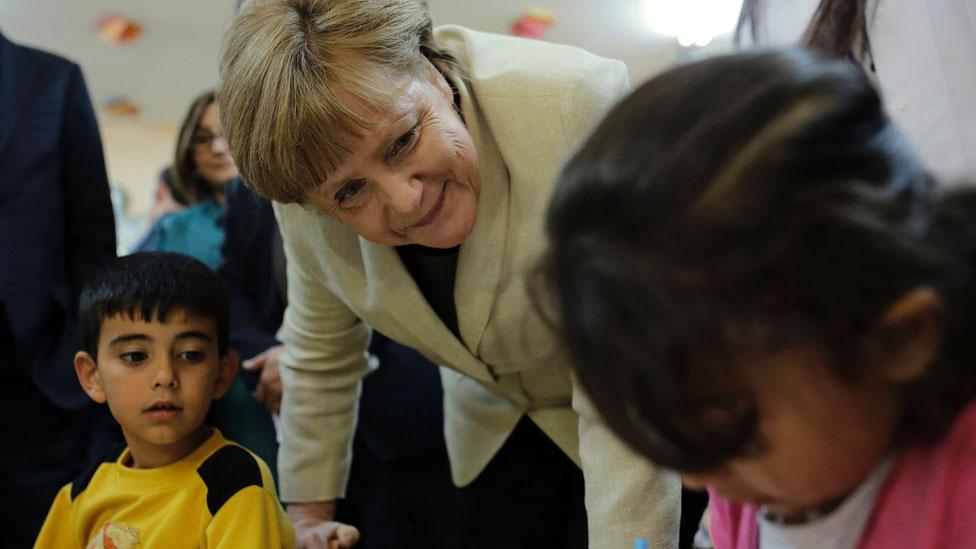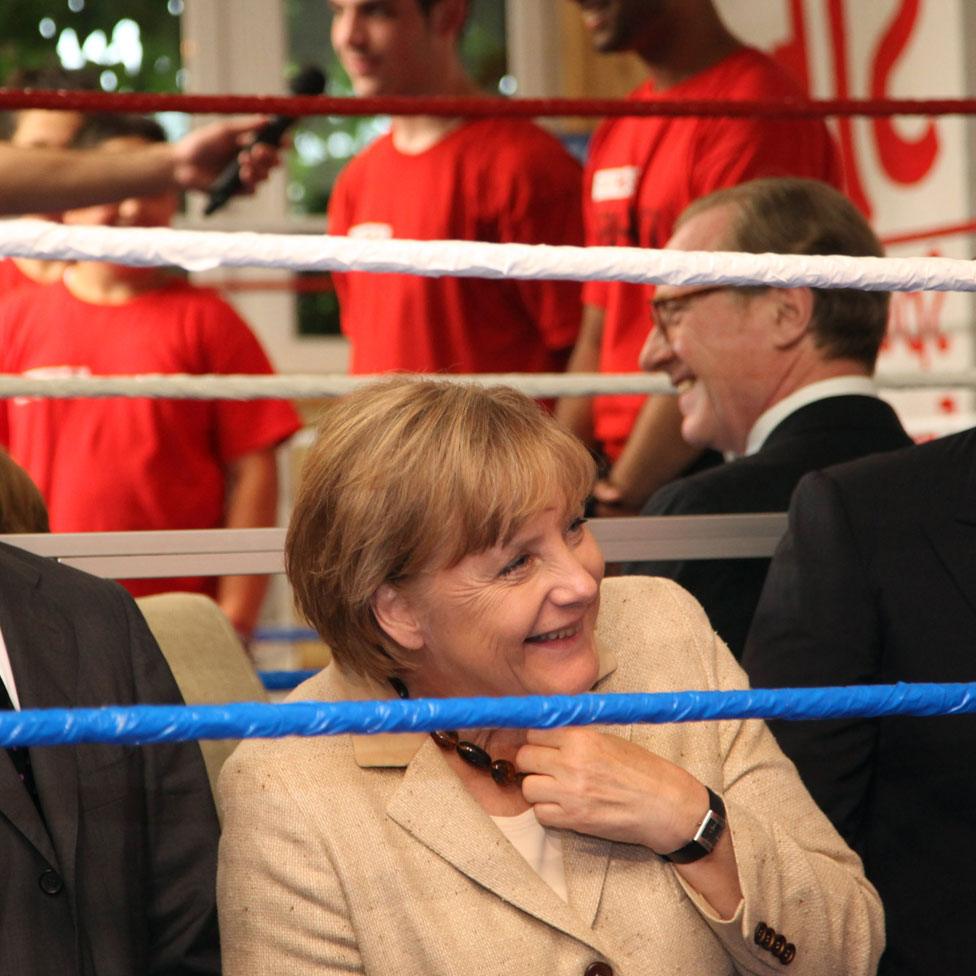Is Angela Merkel really on the ropes?
- Published

At the end of July, Germany was hit by a series of violent attacks, three of which were carried out by asylum seekers. So are Germans turning against Chancellor Angela Merkel's refugee policy? Damien McGuinness in Berlin is not convinced.
"Merkel on the ropes!" screeched one headline, external, after the recent attacks in Germany, before going on to predict confidently that her "premiership is hanging by a thread".
"Calls for Chancellor Angela Merkel to stand down grow," wrote another paper, external.
But what's interesting about these and similar articles is that they were written by English-speaking journalists reporting from outside Germany.
And in both these cases, the only evidence that Merkel's government was apparently about to fall was a video filmed by Russian TV, external of right-wing extremists protesting in Berlin. No polling data. No evidence. Just that video.
You can't necessarily blame the journalists. From the outside the narrative makes sense. Merkel allows Germany to take in more than a million asylum seekers from the Middle East. A year later there are violent Islamist attacks committed by migrants. So it stands to reason that her government is on the verge of collapse.
The problem is, though, the facts really get in the way of that story. Almost 70% of Germans do not think that Merkel's refugee policy contributed to the attacks, and the violence has barely had any effect on support for her centre-right party, making it unlikely that anyone else will lead the next government, let alone topple the present one.
Since the attacks, her personal approval ratings have slipped, but almost half of German voters, across the political spectrum, say they still want her as chancellor. In fact, she has no credible rivals - the left-wing opposition is small and the anti-migrant Alternative for Germany party is riven with internal rivalries.

Angela Merkel at a memorial service for the victims of the Munich shooting spree
In times of turmoil, history shows that the unflappable Angela Merkel actually does quite well. With every crisis she's written off by many commentators. But weirdly, like some indestructible rubber cartoon character, she bounces back. From Brexit to eurozone chaos, she's seen as a safe pair of hands.
Even, to a large extent, after these latest attacks. At first there was some criticism that she was too slow to respond. Immediately after the Munich shooting, in which 10 people died, French President Francois Hollande condemned what he called a brutal act of Islamist terror. Some here said: "Why does the French leader speak, and not ours?"

From Our Own Correspondent has insight and analysis from BBC journalists, correspondents and writers from around the world
Listen on iPlayer, get the podcast or listen on the BBC World Service or on Radio 4 on Saturdays at 11:30 BST

Until, it turned out, that it wasn't an act of Islamist terror at all - but rather a US-style shooting spree, carried out by a disturbed German-born teenager obsessed with right-wing extremism and mass shootings.
And that's the point: despite what the most lurid headlines indicate, unlike France, Germany hasn't yet been hit by a major Islamist terror attack. In the two recent attacks by asylum seekers, which were claimed by so-called Islamic State, no victim was killed.
That's not to ignore the fierce debate around Berlin's refugee policy - Germany is split. People are nervous about more attacks and increasingly uneasy about migration. And with parliamentary elections next year, Merkel faces pressure from all her rivals - from the left and from the right.

Angela Merkel meets children at a refugee camp on the Turkish-Syrian border in April
There are calls to screen migrants better. Many now say failed asylum seekers should be sent back, whether they've come from a war zone or not. And dip into German social media, and the criticism of Merkel becomes vicious.
But no leading politician suggests that Germany should stop accepting refugees fleeing war, and some of the pressure on Merkel comes from left-wing critics, who say she's not doing enough to help migrants.
The debate in the mainstream media, meanwhile, is the very opposite of alarmist. The tabloid, Bild, Germany's best-selling newspaper, has positioned itself as the crusading champion of refugee rights, while traditionally tough-talking ministers have warned against stigmatising migrants since the attacks.
More violence, or a major IS terror attack, could endanger this measured approach. And some do question whether too cosy a consensus in the mainstream marginalises legitimate concerns that should be debated.
But the attitude of German political leaders also hints at a deeper question - namely, what is the responsibility of government? Should it lead or follow popular opinion?
Angela Merkel's idea of government is top-down, trust-us-we-know-best, which in this age of referendums and social media is not exactly fashionable. But she's not following, she's leading. Not everyone agrees with her, and her approach is not risk-free. Merkel, though, is not changing her mind. And, for now at least, she's staying exactly where she is.

Follow @BBCNewsMagazine, external on Twitter and on Facebook, external